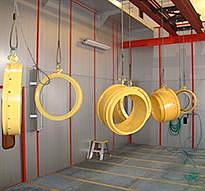December 31, 2013
Here are the top three reasons to use or to consider adding PPS / Ryton®:
Wear, Creep and Abrasion Resistance
PPS is, simply put, one of the toughest coating polymers out there. Its extreme wear resistance of makes it a favorite of two industries in which wear is the major issue: automotive engineering, and industrial and commercial cookware. If wear, creep, or abrasions are causing you to need to recoat parts often – using PPS will undoubtedly save you money.
Serious Chemical Resistance
If you’re using Halar® ECTFE or ETFE for chemical resistance, but you need a thinner coating, then PPS is a no-brainer. It’s one of the few thin-film polymers that provides truly outstanding chemical resistance. It strongly resists acids and alkalies even under extreme conditions, and can resist some solvents (although if major solvent exposure is your main concern, PPS might not be your first choice).
Thin-Film, and Can Be Built Up
When it comes to thin-film coatings, PPS or Ryton® ranks with the best. Typical thicknesses are listed as ranging from 1 – 2 mils, but with an experienced applicator, PPS can be applied at thicknesses under 1 mil, pinhole-free. PPS can also be built up with the application of multiple coats or a hot slurry spray (again requiring an experienced coater to build up thickness uniformly without dripping or burning). All of which to say: PPS can be applied at nearly any thickness you need, and can be added as a primer or top-coat layer without adding too much thickness.
